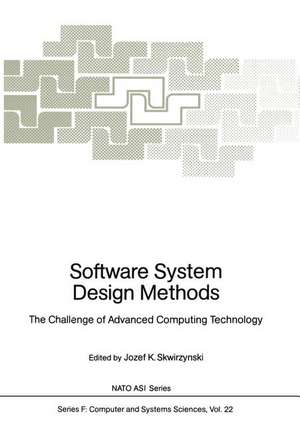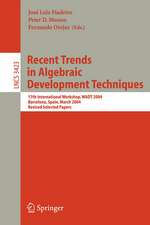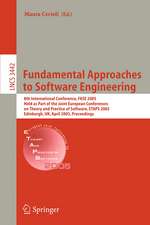Software System Design Methods: The Challenge of Advanced Computing Technology: NATO ASI Subseries F:, cartea 22
Editat de Josef K. Skwirzynskien Limba Engleză Paperback – 16 dec 2011
Din seria NATO ASI Subseries F:
- 20%
 Preț: 650.27 lei
Preț: 650.27 lei - 20%
 Preț: 668.55 lei
Preț: 668.55 lei - 20%
 Preț: 992.44 lei
Preț: 992.44 lei - 18%
 Preț: 1239.19 lei
Preț: 1239.19 lei - 20%
 Preț: 1922.81 lei
Preț: 1922.81 lei - 20%
 Preț: 654.37 lei
Preț: 654.37 lei - 18%
 Preț: 1234.00 lei
Preț: 1234.00 lei - 20%
 Preț: 709.78 lei
Preț: 709.78 lei - 20%
 Preț: 656.03 lei
Preț: 656.03 lei - 18%
 Preț: 1854.94 lei
Preț: 1854.94 lei - 20%
 Preț: 374.97 lei
Preț: 374.97 lei - 20%
 Preț: 991.94 lei
Preț: 991.94 lei - 20%
 Preț: 671.02 lei
Preț: 671.02 lei - 20%
 Preț: 1925.96 lei
Preț: 1925.96 lei - 20%
 Preț: 994.73 lei
Preț: 994.73 lei -
 Preț: 389.49 lei
Preț: 389.49 lei - 20%
 Preț: 657.99 lei
Preț: 657.99 lei - 20%
 Preț: 655.20 lei
Preț: 655.20 lei - 18%
 Preț: 1225.31 lei
Preț: 1225.31 lei - 18%
 Preț: 952.09 lei
Preț: 952.09 lei - 20%
 Preț: 332.06 lei
Preț: 332.06 lei - 20%
 Preț: 1284.47 lei
Preț: 1284.47 lei - 20%
 Preț: 644.81 lei
Preț: 644.81 lei -
 Preț: 395.85 lei
Preț: 395.85 lei - 18%
 Preț: 1221.07 lei
Preț: 1221.07 lei - 15%
 Preț: 643.34 lei
Preț: 643.34 lei - 20%
 Preț: 645.47 lei
Preț: 645.47 lei - 20%
 Preț: 1282.98 lei
Preț: 1282.98 lei - 20%
 Preț: 656.36 lei
Preț: 656.36 lei - 20%
 Preț: 1283.31 lei
Preț: 1283.31 lei - 20%
 Preț: 1924.15 lei
Preț: 1924.15 lei - 20%
 Preț: 362.24 lei
Preț: 362.24 lei
Preț: 674.00 lei
Preț vechi: 842.50 lei
-20% Nou
Puncte Express: 1011
Preț estimativ în valută:
128.97€ • 135.02$ • 106.71£
128.97€ • 135.02$ • 106.71£
Carte tipărită la comandă
Livrare economică 05-19 aprilie
Preluare comenzi: 021 569.72.76
Specificații
ISBN-13: 9783642828485
ISBN-10: 3642828485
Pagini: 768
Ilustrații: XIII, 747 p.
Dimensiuni: 170 x 244 x 40 mm
Greutate: 1.2 kg
Ediția:Softcover reprint of the original 1st ed. 1986
Editura: Springer Berlin, Heidelberg
Colecția Springer
Seria NATO ASI Subseries F:
Locul publicării:Berlin, Heidelberg, Germany
ISBN-10: 3642828485
Pagini: 768
Ilustrații: XIII, 747 p.
Dimensiuni: 170 x 244 x 40 mm
Greutate: 1.2 kg
Ediția:Softcover reprint of the original 1st ed. 1986
Editura: Springer Berlin, Heidelberg
Colecția Springer
Seria NATO ASI Subseries F:
Locul publicării:Berlin, Heidelberg, Germany
Public țintă
ResearchCuprins
1. The Development of Low-Fault and Fault-Tolerant Software.- Four Applications of Software Data Collection and Analysis Methodology.- Recursively Structured Fault-Tolerant Distributed Computing Systems.- Knowledge Engineering Techniques Applied to Fault Detection Test Generation and Maintenance.- Software Development Under Statistical Quality Control.- Life Time Distributions for Coherent Systems.- Panel Discussion on Safety Analysis of Computer Programs Using Fault Trees.- 2. Human Factors in Development and Use of Software.- Psychological Research on Software Development.- From Interactive to Intelligent System.- Design and Use of Programming Languages.- Panel Discussion on Will Artificial Intelligence Make Human Factors Obsolete?.- 3. The Development and Status of Empirical/Statistical Reliability Models for Software and Their Relation to Reality.- Application of Basic and Logarithmic Poisson Execution Time Models in Software Reliability Measurement.- Tools for the Analysis of the Accuracy of Software Reliability Predictions.- The Use of Exploratory Data Analysis Techniques for Software Reliability Assessment and Prediction.- Failure Patterns and Reliability Growth Potential for Software Systems.- The Use of Regression Techniques for Matching Reliability Models to the Real World.- The Assessment of Software Reliability for Systems with High Reliability Requirements.- Process and Design Considerations as They Affect the Number, Nature and Disclosure of Software Faults.- Assessing System Reliability Using Censoring Methodology.- Statistical Design of Experiments for Computer Performance Evaluation.- Reliability Analysis for Integrated Voice/Data Networks.- Computers of the Fifth Generation and Their Role in Communications.- The Rationale of Reliability Prediction.- 4.The Economics of Computing and Methods of Cost Assessment.- Needs Assessment: The First Step in a Cost-Effective Design of a Computer-Based System.- Steps Toward Establishing Normal Rules for Software Cost, Schedule, and Productivity Estimating.- The Economics of Software.- Panel Discussion on Comparison of Evaluation Methods of Cost Assessment in Computing.- Panel Discussion on Software Cost Estimating.- 5. Security, Safety, Privacy and Integrity in Developing and in Using Computer Communication and Computer Data Storage and Retrieval.- Security, Privacy, Safety and Resiliency in Computation.- Software Hazard Analysis Techniques.- Data Security.- Panel Discussion on Human Beings as the Source of Problems, Concerns and Protection Needs, e. g. Computer Crime.- Summary of Panel Discussion on Women in Information Science.- List of Delegates.




















